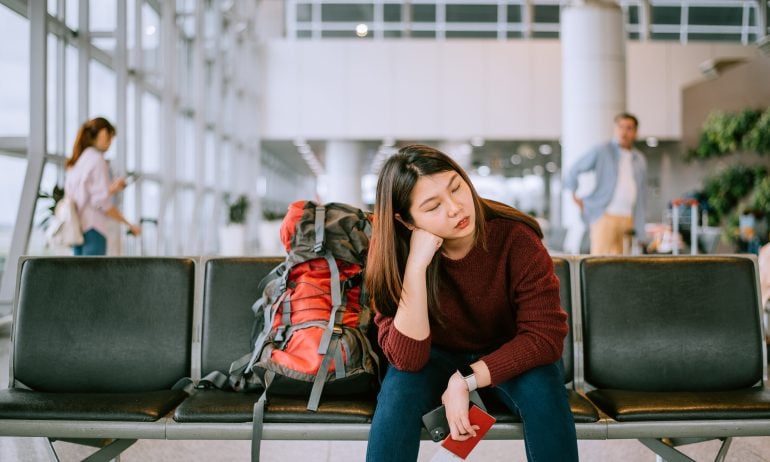Should U.S. Airlines Pay Passengers for Delays Like the EU?

Many or all of the products featured here are from our partners who compensate us. This influences which products we write about and where and how the product appears on a page. However, this does not influence our evaluations. Our opinions are our own. Here is a list of our partners and here's how we make money.
Southwest Airlines spent the early part of 2023 trying to make good after a historic meltdown resulted in more than 16,700 canceled flights during the 2022 holidays. The airline reimbursed passengers for the cost of alternative travel arrangements and sent many travelers additional loyalty points.
Southwest wasn’t legally required to. The U.S. has no federal laws mandating that airlines compensate passengers for delays. Airlines are only obligated to offer refunds if they cancel a flight and the passenger decides not to travel.
That’s hardly the case in Europe. An EU regulation, commonly referred to as EU261, requires airlines to compensate travelers for cancellations, denied boarding or delays of two or more hours. It went into effect in 2005 and applies to most flights operated by airlines based in the 27 EU countries, plus Iceland, Norway and Switzerland.
As long as the flight wasn’t disrupted due to an “extraordinary circumstance” such as weather, passengers are entitled to compensation from 250 euros (about $260) to 600 euros (about $630), depending on the length of flight and delay. Some passengers are also entitled to free meals and accommodations.
Has EU261 actually reduced delays?
Given the financial pressure to pay out passengers, it might seem airlines are incentivized to stay on schedule, but some studies show that it might not help with being on time at all. Even when it does, there might only be marginal improvements. A 2018 study from the European University Institute concluded flights regulated by EU261 are 5% more likely to arrive on time, resulting in an average arrival delay reduction per flight of just 3.9 minutes.
But another report prepared for the European Commission by consultancy Steer in January 2020 found evidence of the contrary. Their study analyzed flights between 2011 and 2018 that were canceled or delayed by at least two hours.
In 2011, just 0.9% of flights were delayed more than 2 hours, and 1% of flights were canceled entirely. By 2018, 1.4% of flights experienced 2+ hour delays and 1.7% were canceled, suggesting the rate of flight disruptions is increasing.
New problems introduced by EU261
Experts say EU261 has spawned new challenges. For one thing, the definition of “extraordinary circumstances” for delays (upon which airlines don’t have to pay out) remains unclear. After all, the point at which a storm morphs beyond manageable is debatable. The government also never established a consistent process to file claims, and many airlines make it difficult to do so.
For airlines, there are also the added administrative costs of processing claims, as well as potentially more idle aircraft and schedule padding to help prevent delays. Some experts worry that financial pressure might compel staff to rush through or ignore potential issues, presenting unnecessary safety and technical risks.
U.K.-based aviation consultancy Baines Simmons surveyed 300 airline workers online about safety implications of EU261 as part of a 2019 report published by the European Regions Airline Association (ERA). Of the respondents, 67% said the regulation had a negative impact on aviation safety.
Plus, 2023 compensation isn’t as valuable as it was back in 2005. “Since the onset of the regulation, the real value of compensation has decreased by over 20% due to inflation, according to an October 2018 report from the College of Europe.
Who loses and wins under policies like EU261?
Losers: Airlines (especially small, regional ones)
To minimize delays, airlines sometimes engage in schedule padding, where they advertise longer flight times than it actually takes to better ensure that on-time arrival. That results in underutilized staff, fewer scheduled flights and more idle aircraft. Some airlines keep spare aircraft on standby, incurring additional leasing and maintaining costs.
Steer estimates such mitigation measures contributed about 0.4% to airlines’ overall costs in 2018. EC261 also introduced new administrative and legal costs, which Steer estimates amounted to 0.6% of airline costs.
Some experts suggest that regulations especially hurt small airlines that can’t afford to have spare aircraft on standby or software to handle the compensation claims. The fixed payout amounts to passengers can have an outsized impact on shorter routes or budget airfares.
“Compensating 250 euros on a flight that costs 50 euros is clearly absurd,” said former Flybe CEO Christine Ourmières-Widener in a testimonial generated for a 2019 report published by the European Regions Airline Association. Flybe is a now-defunct British regional airline.
Sometimes winners, sometimes losers: Passengers
This one is a toss-up, and it depends on your perspective.
When passengers lose
Airlines sometimes pass off EU-261-related losses to customers. Low-cost carrier Ryanair at one point passed it off in the most literal way possible: charging a €2.50 levy per flight, per passenger to cover compensation payments (though it no longer charges that fee).
Even for passengers not paying an outright fee, a report prepared for the European Commission by consultancy Steer in January 2020 suggests that customers pay for it via higher airfares. The consultancy analyzed data from the European Organisation for the Safety of Air Navigation, airlines and claim agencies, and found that the average direct cost per passenger was €1.8 in 2011.
While €1.8 (or about $2.50 in 2011 U.S. dollars) might feel insignificant — and some folks argue that the small cost is worth it) — that cost is rising. By 2018, costs increased to €4.4 (or $2.95 in U.S. dollars) per passenger, a compound annual growth rate of more than 13%.
When passengers win
Delays can cost passengers via time, inconvenience and stress, and sometimes literal expenses like food and lodging. Government laws mandating compensation can alleviate that burden if passengers are willing to put in the time to file the paperwork.
Raj Mahal, founder of PlanMoreTrips, an app that helps travelers find cheap airfares, was flying home to Barcelona after spending the 2022 winter holidays in Portugal. His TAP Air Portugal flight was delayed by three hours, which the airline blamed on weather (though Mahal says other flights were departing).
Mahal filed a claim through TAP’s Self Service feature, but the airline initially offered him just half of what he felt he was entitled to. It wasn’t until after he fired off an angry tweet (which the airline responded to) that he felt he received fair compensation.
The rate of passengers claiming compensation has increased, suggesting more people are getting money for their inconvenience. In 2018, 38% of eligible passengers claimed compensation, up from just 8% in 2011, according to a 2021 European Commission study.
Winners: Third-party claims agencies
That uptick in passengers claiming compensation is in part due to the proliferation of claims agencies, such as AirHelp. These third-party claims agencies help passengers navigate the claims process, but often take a cut of compensation. For example, AirHelp typically takes a 35% cut of the traveler’s compensation.
While companies such as AirHelp credibly threaten to sue airlines who don’t comply and help customers navigate the claims process, they also charge a fee to distressed passengers — in turn profiting off EU261.
Should the U.S. adopt similar regulations?

If the goal is financial incentives to increase on-time flights, U.S. airlines may already have that. Even without government-required compensation, delays cost airlines $8.3 billion in increased expenses, including crew, fuel and maintenance in 2019, according to the FAA Office of Aviation Policy and Plans.
Ten major U.S. airlines have also made customer service commitments for flights canceled or delayed by three hours or more. That includes rebooking passengers and offering meal vouchers. Most promise hotel accommodations, too. However, none are required to do so by law.
Southwest reported a revenue loss of $410 million during the 2022 fourth quarter, attributed to the December 2022 disruptions, which was just part of their $800 million overall loss. Factoring in the first quarter of 2023, the meltdown cost Southwest more than $1 billion after accounting for lost revenue and passenger reimbursements.
“Southwest is being punished for this,” Robert Poole, director of transportation policy for the Reason Foundation, a nonpartisan think tank, says. “Anybody caught up in the 2022 snafu won’t want to take a chance on this airline again. Southwest lost business and market value. That’s more powerful than anything Congress can do.”
Meanwhile, Mahal has successfully received compensation for shorter disruptions, such as a two-hour delay on an American Airlines flight last month between Austin and Albuquerque.
He emailed American and — within 48 hours — the airline deposited 5,000 miles (worth about $75) into his AAdvantage account.
Even still, Mahal, who is American but lives in Spain, says he prefers the EU’s clear passenger protections.
“The current U.S. system is extremely broken and a joke,” he says. “There needs to be some basic passenger protection laws because the status quo isn't working.”
The Flight Compensation Regulation of the European Union has aided passengers in receiving more consistent compensation for delays. However, despite calls from advocates for the idea to be implemented in the United States, the regulation does not appear to be making waves.
This article was written by NerdWallet and was originally published by The Associated Press.
How to maximize your rewards
You want a travel credit card that prioritizes what’s important to you. Here are our picks for the best travel credit cards of 2024, including those best for:
Flexibility, point transfers and a large bonus: Chase Sapphire Preferred® Card
No annual fee: Bank of America® Travel Rewards credit card
Flat-rate travel rewards: Capital One Venture Rewards Credit Card
Bonus travel rewards and high-end perks: Chase Sapphire Reserve®
Luxury perks: The Platinum Card® from American Express
Business travelers: Ink Business Preferred® Credit Card
on Chase's website
1x-5x
Points60,000
Pointson Chase's website
1.5%-6.5%
Cashback$300
2x-5x
Miles75,000
Miles




